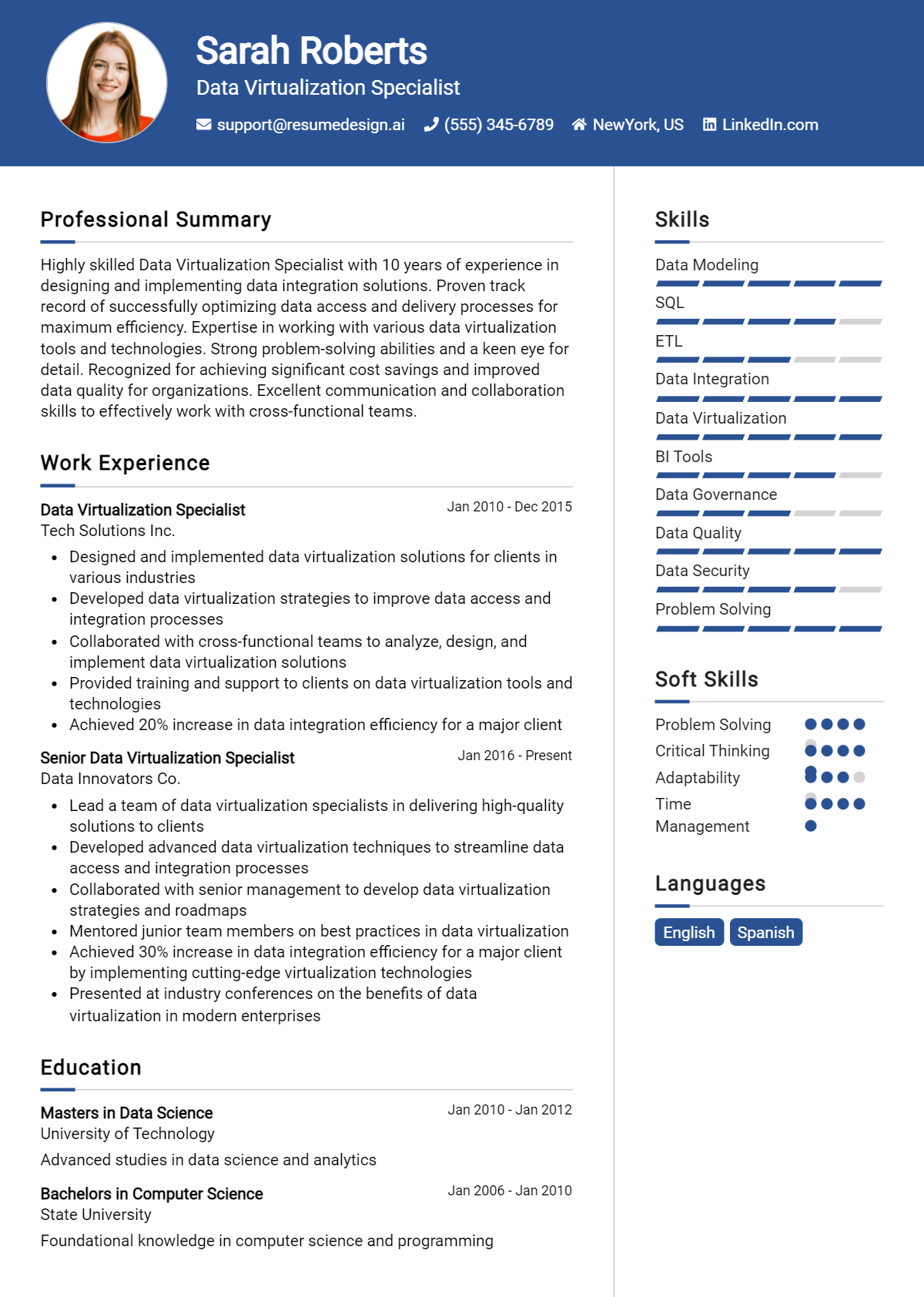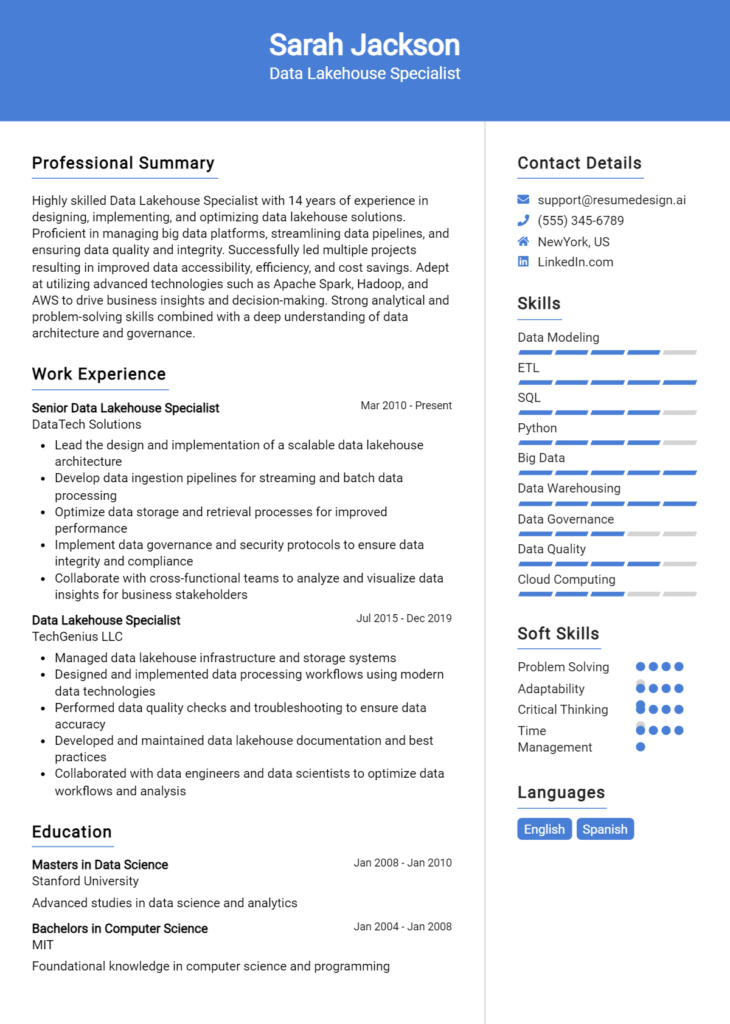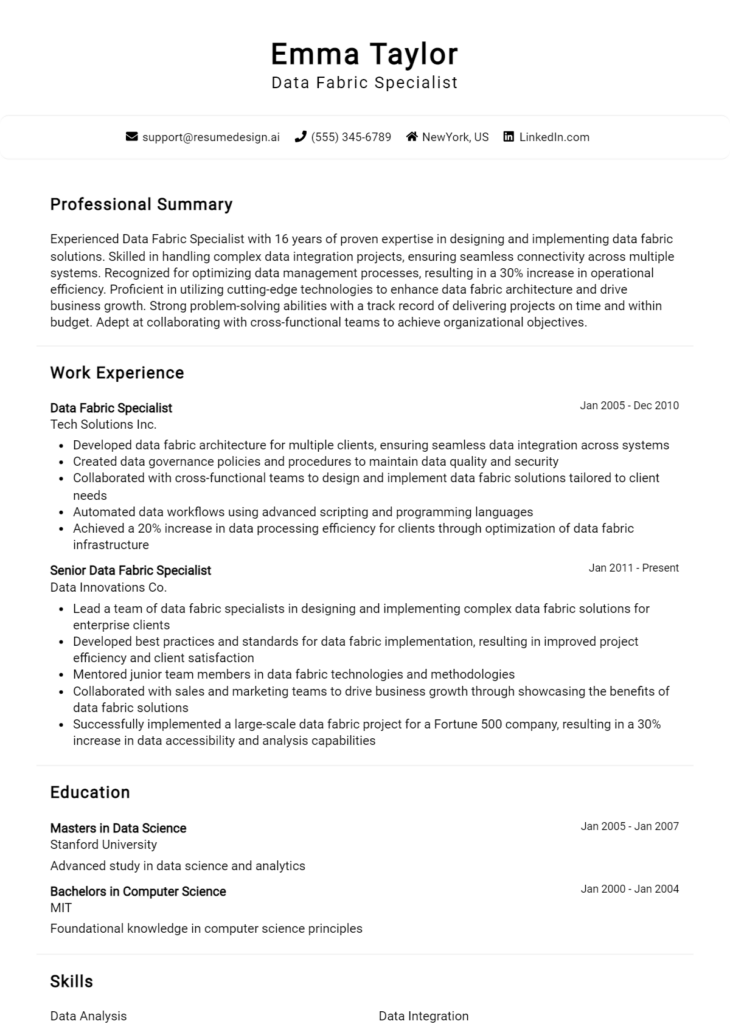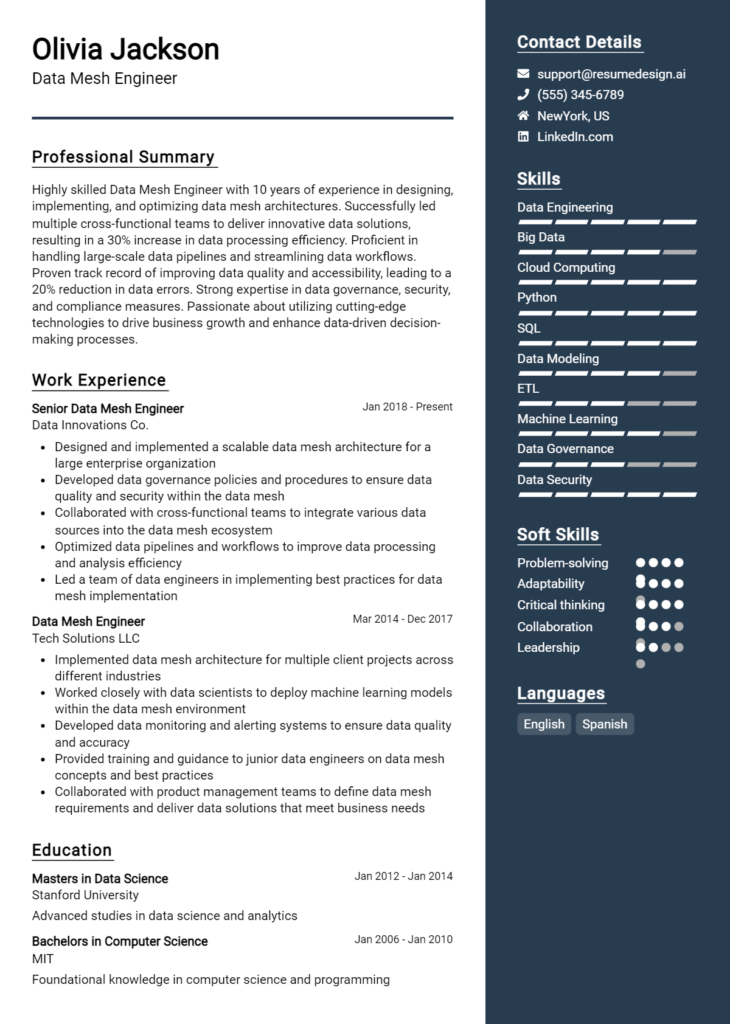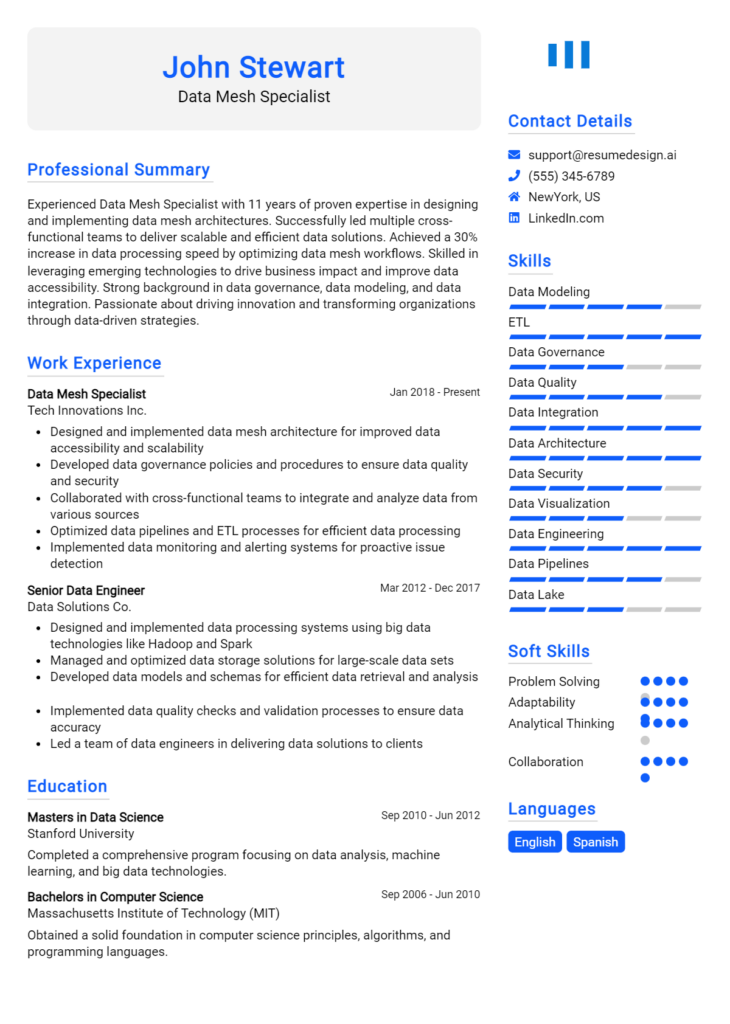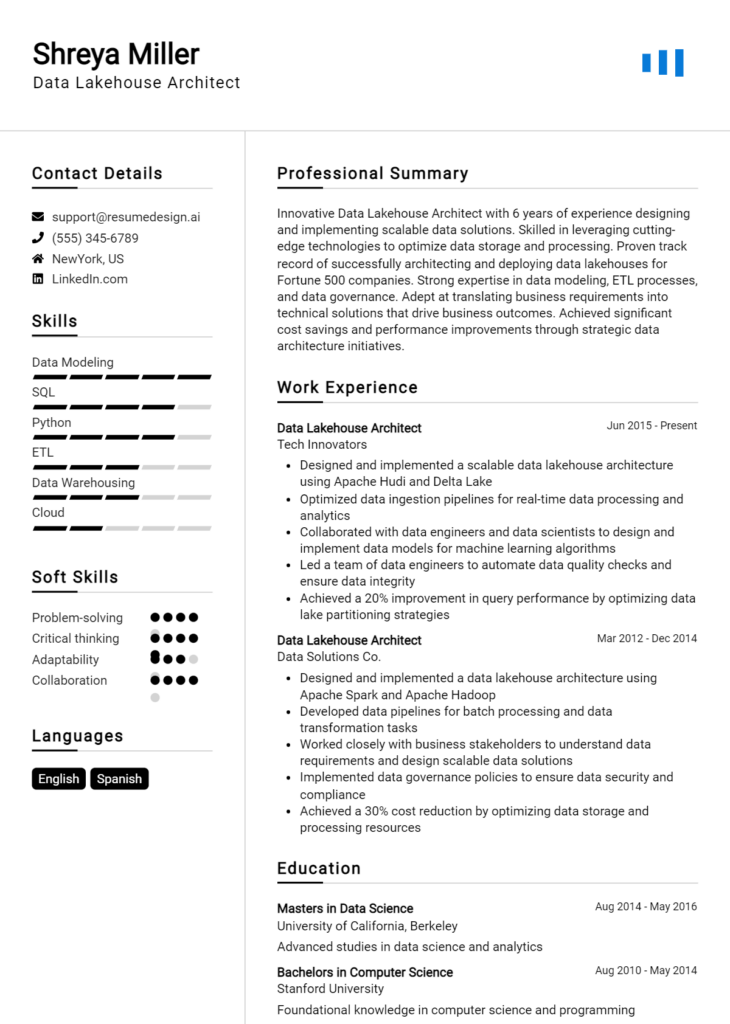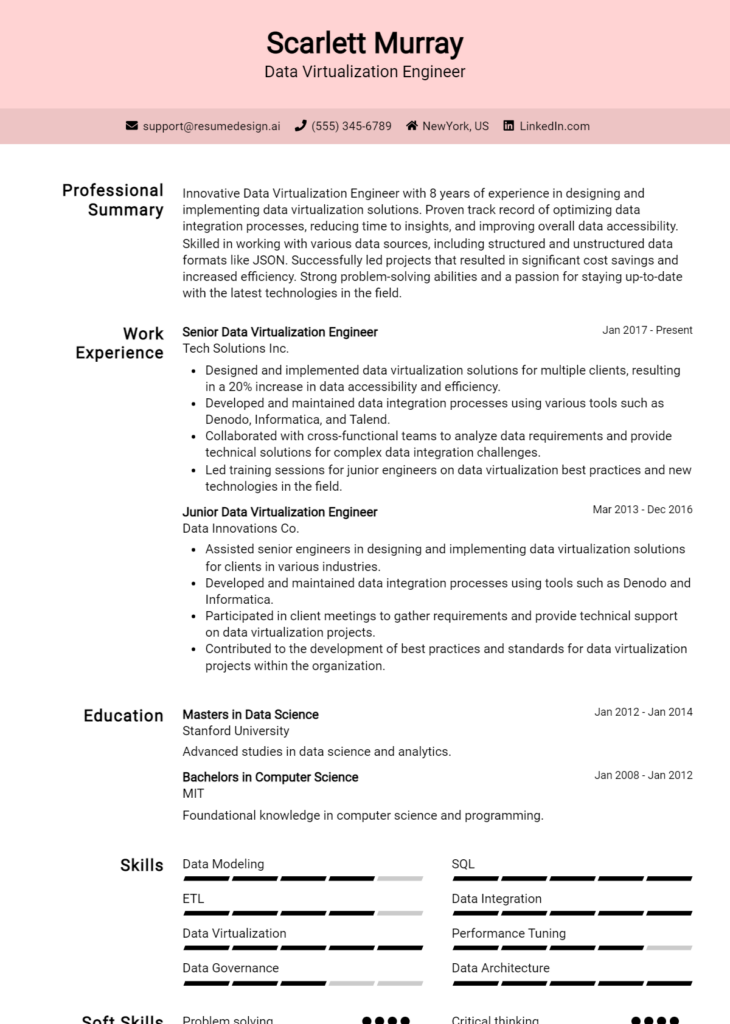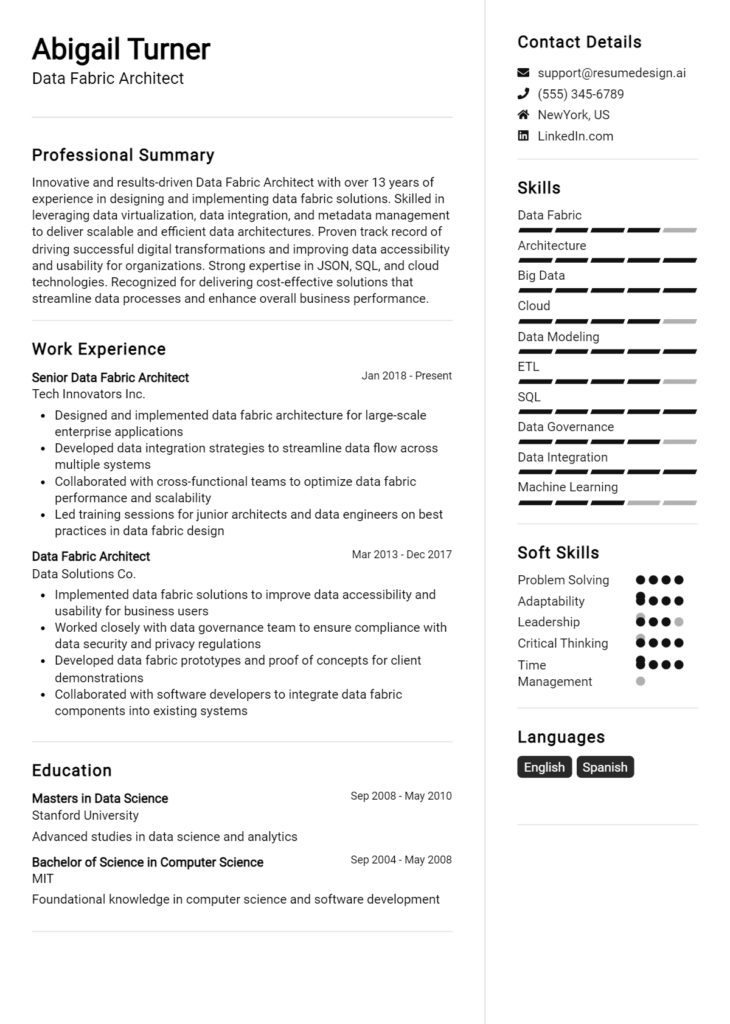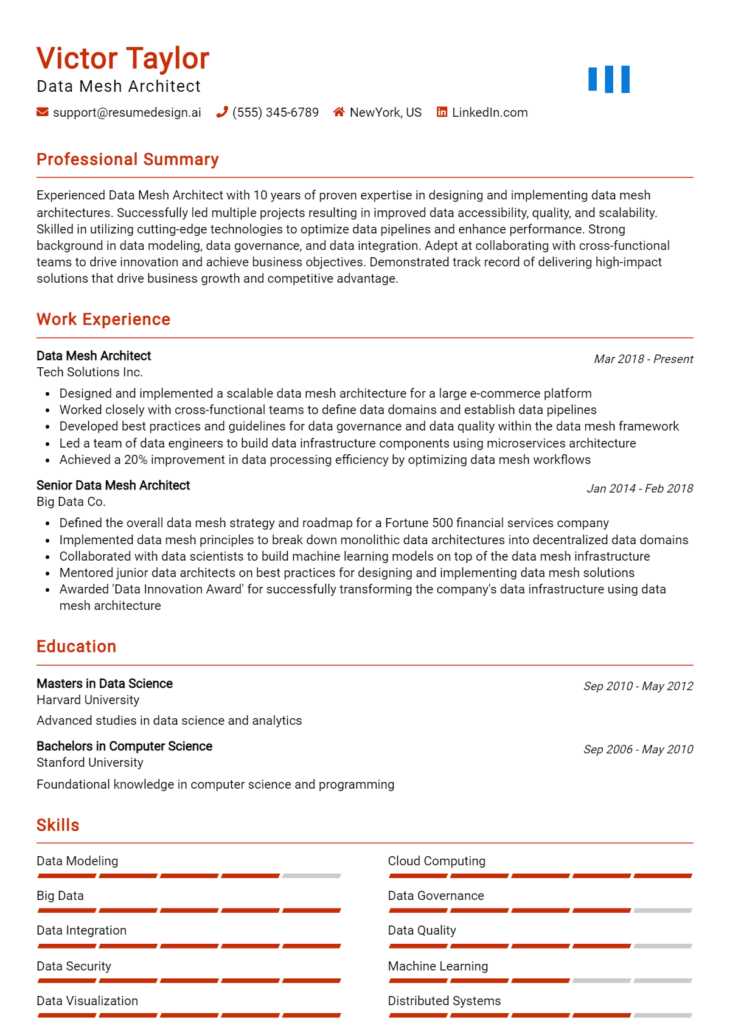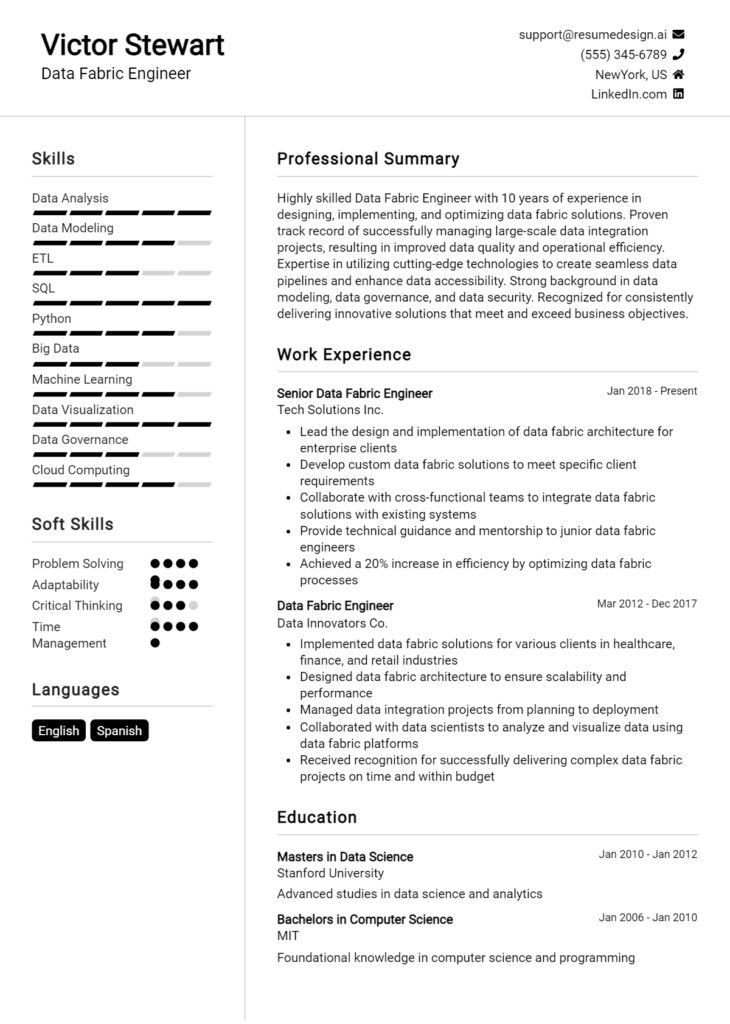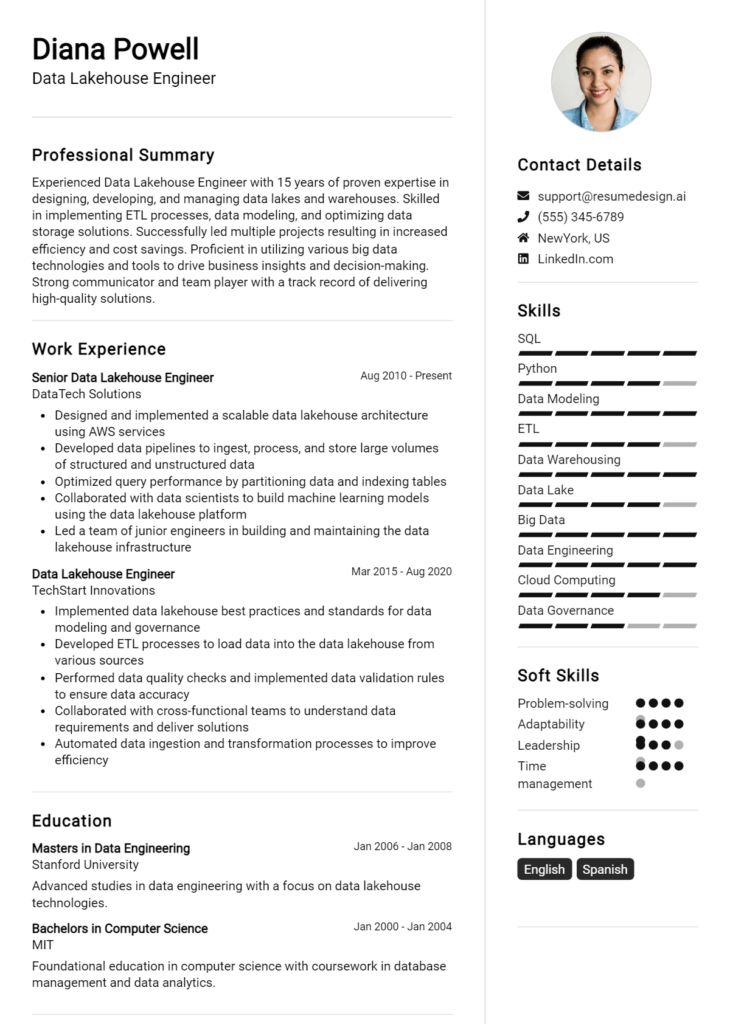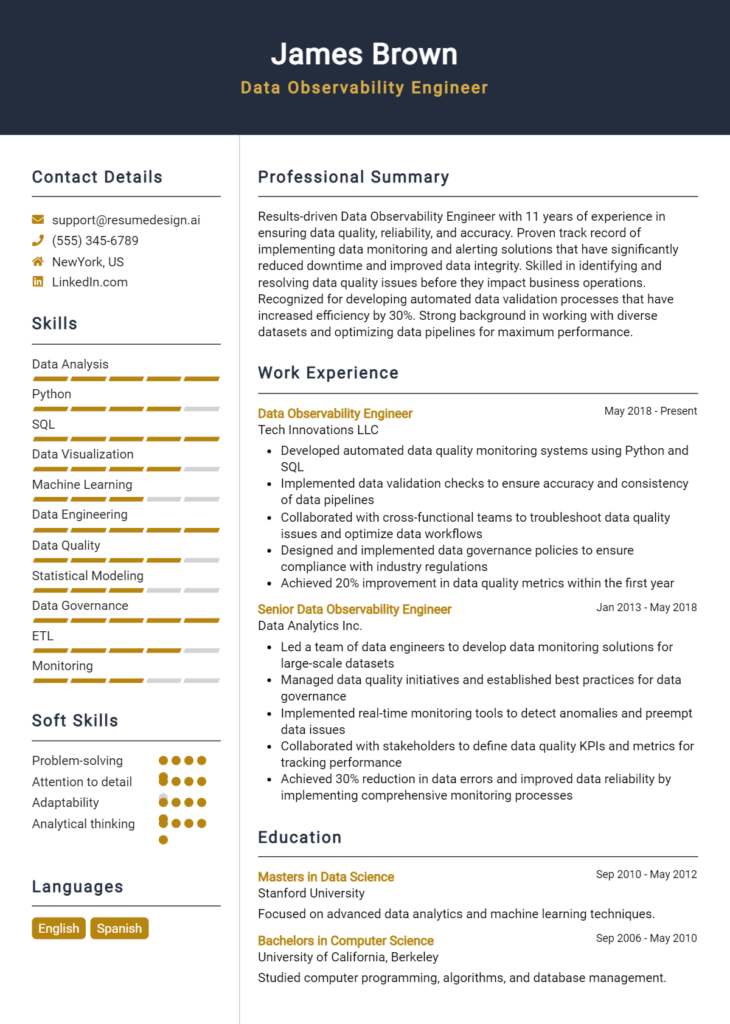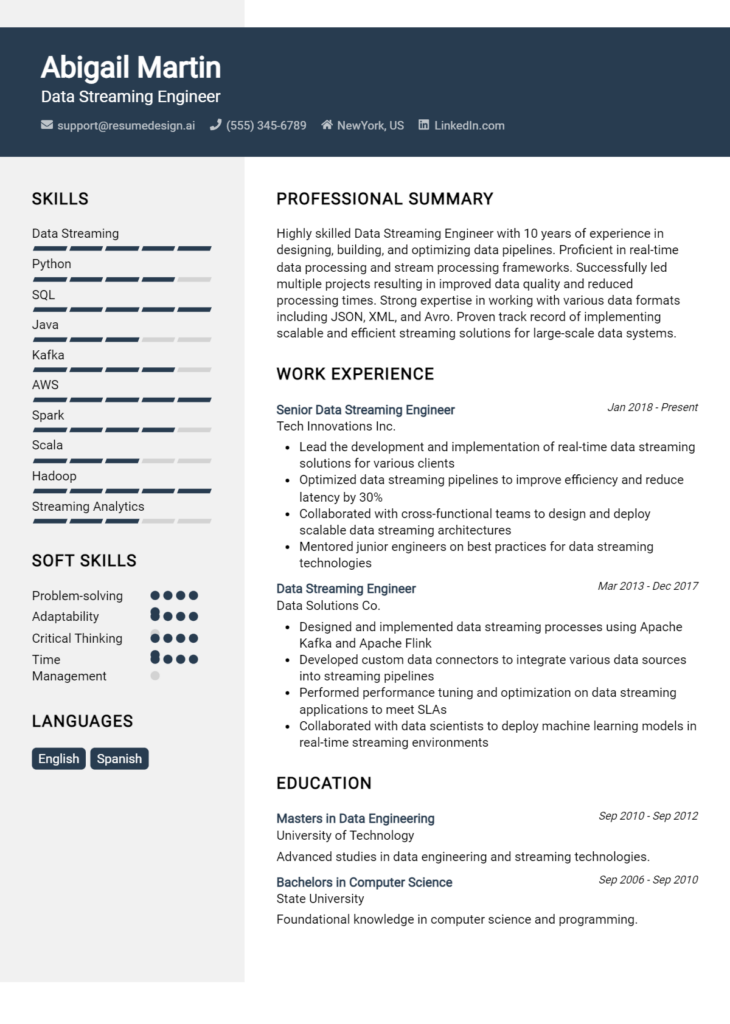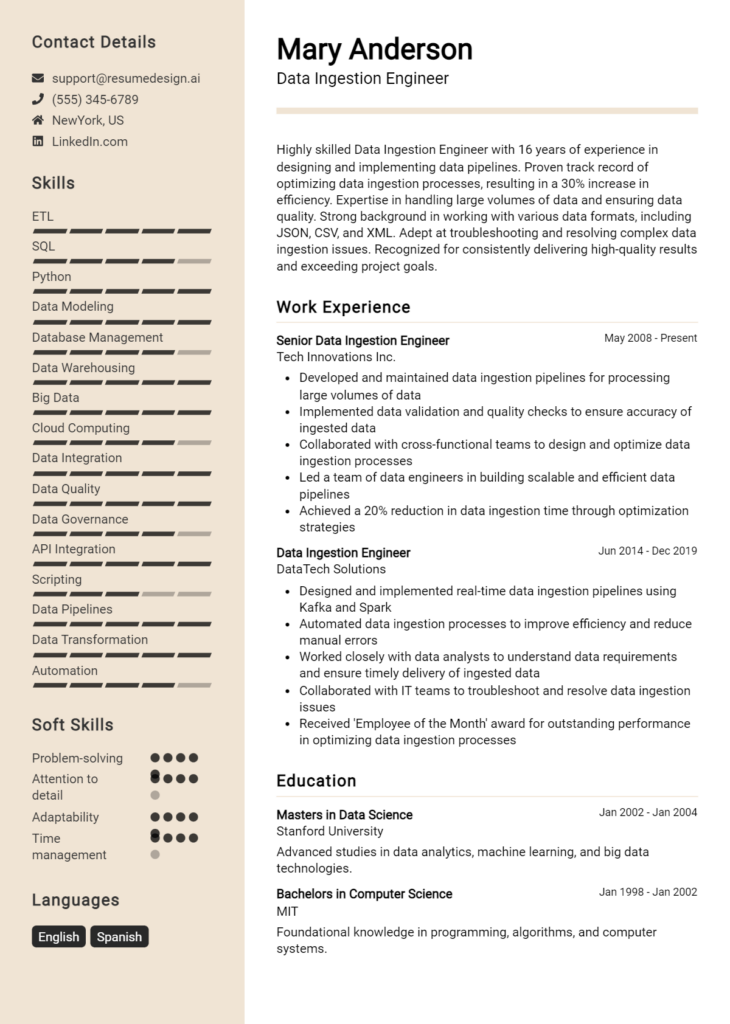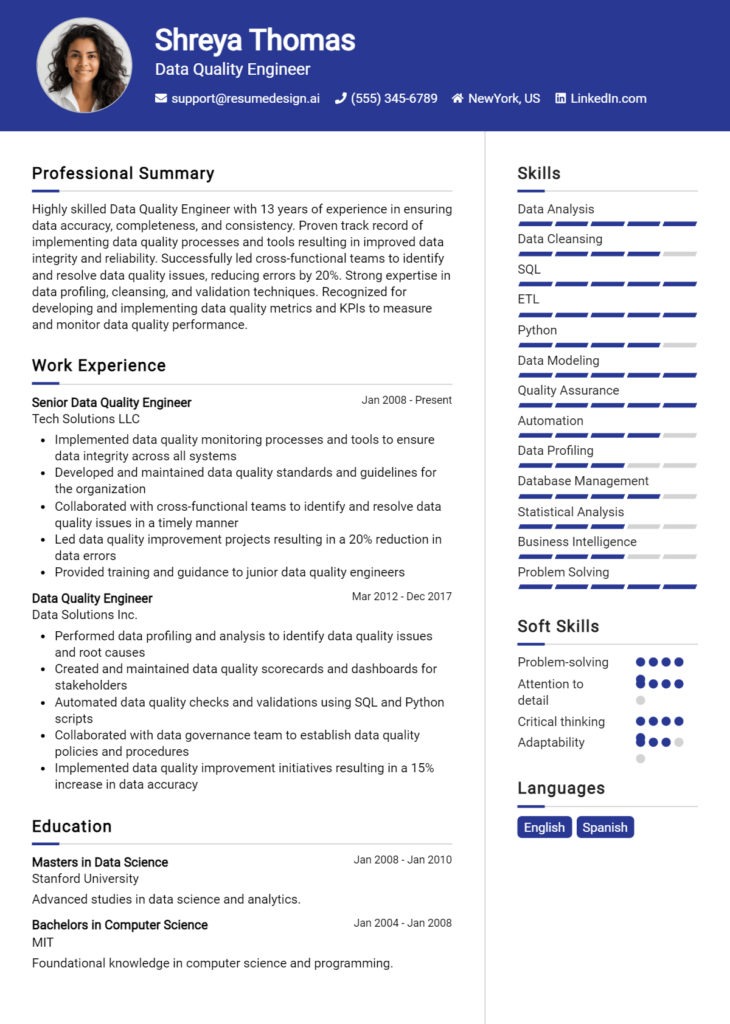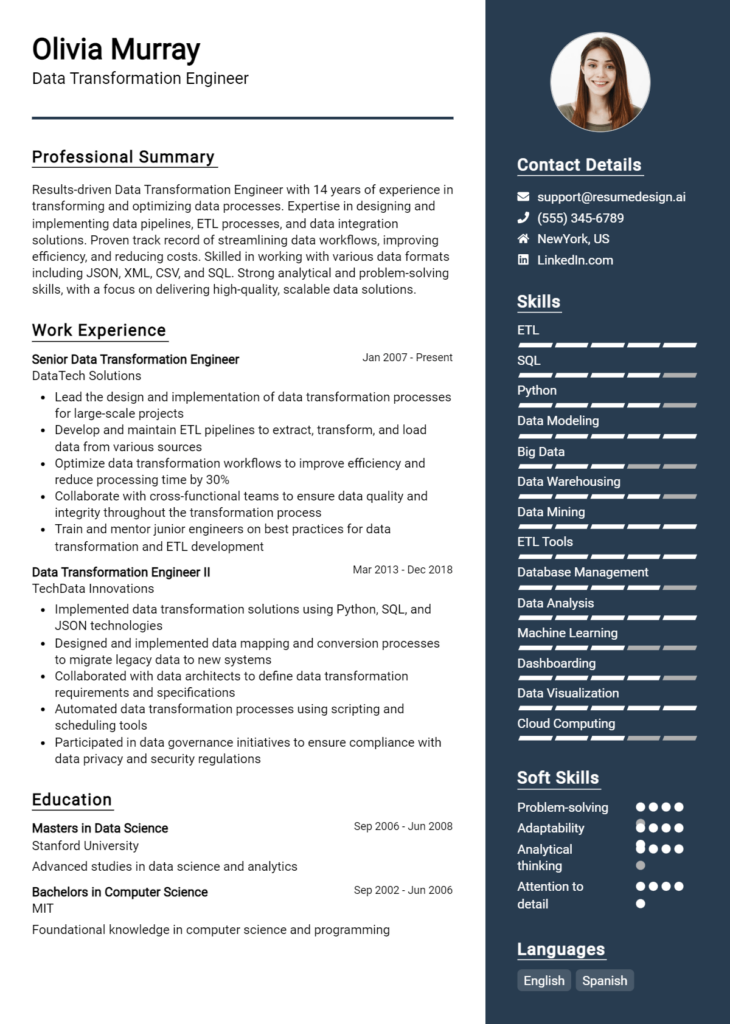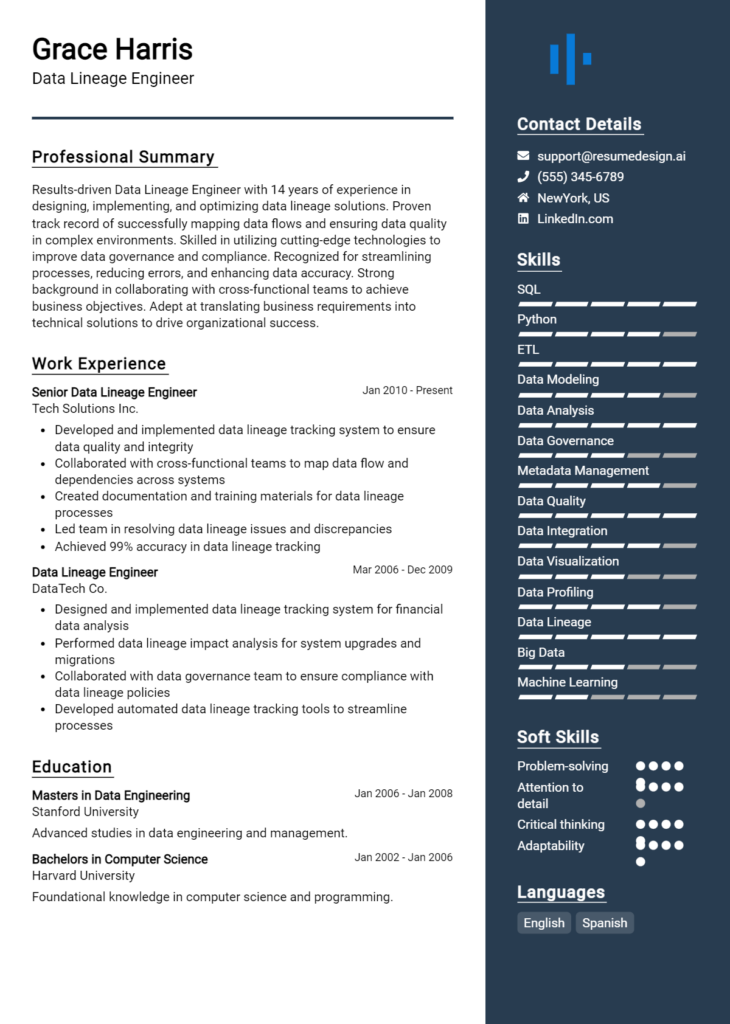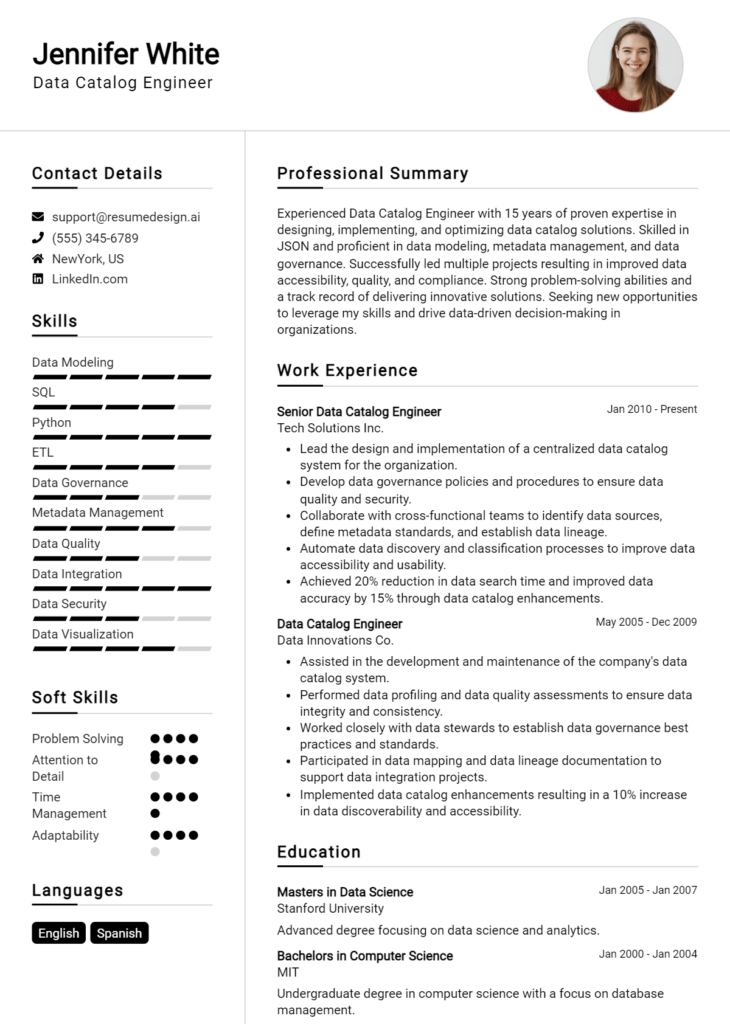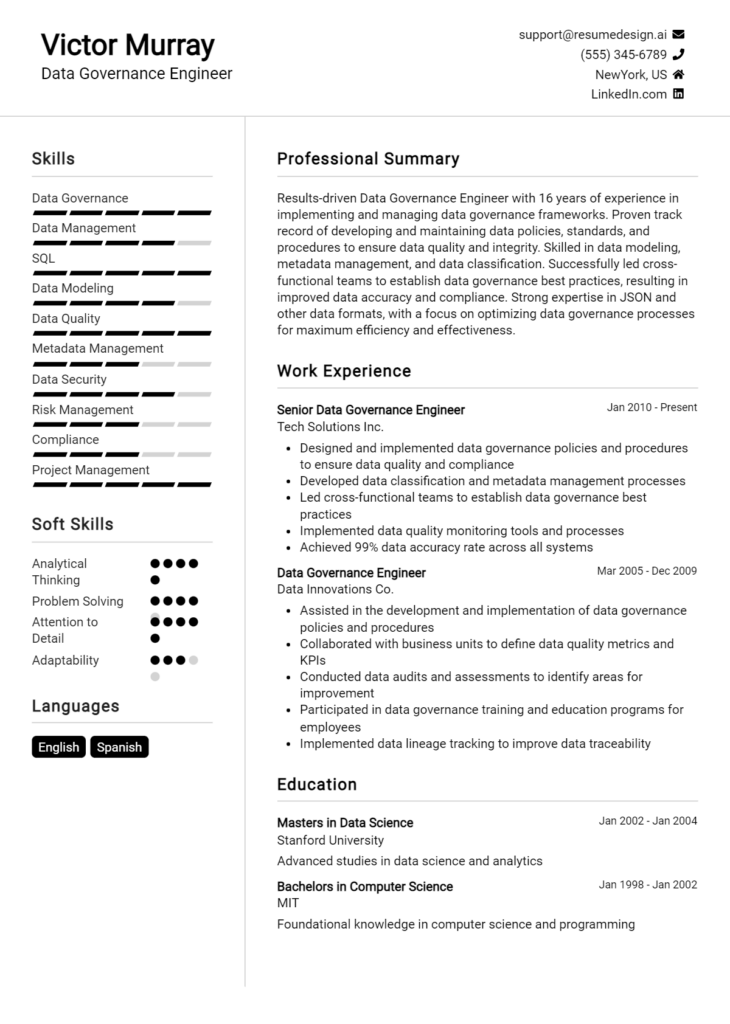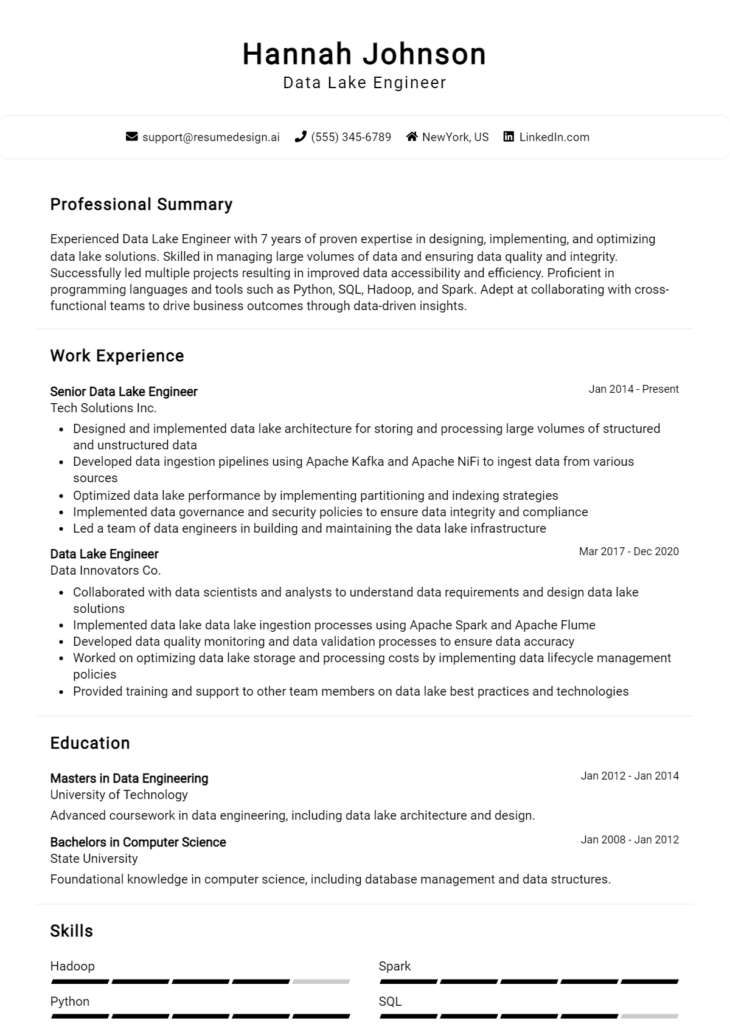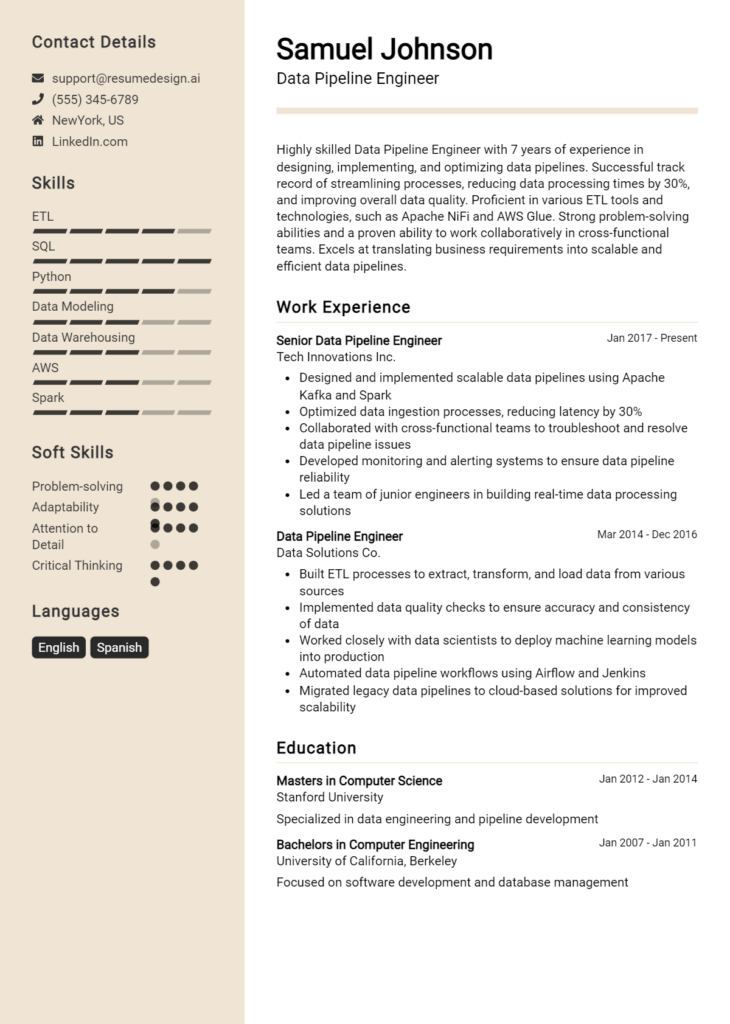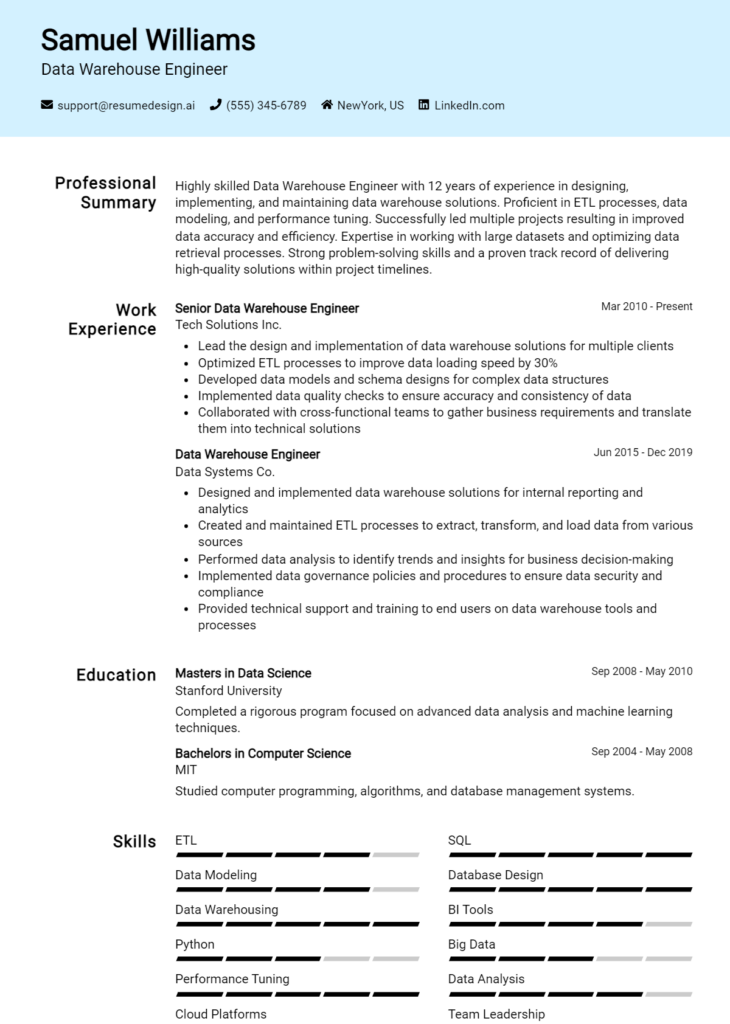Data Virtualization Specialist Core Responsibilities
A Data Virtualization Specialist plays a crucial role in bridging various departments by integrating data from disparate sources, enabling seamless access and analysis. Key responsibilities include designing data virtualization solutions, optimizing data delivery, and ensuring data quality across platforms. Essential skills encompass strong technical knowledge, operational insight, and adept problem-solving abilities. These competencies are vital for supporting the organization's strategic objectives. A well-structured resume that highlights these qualifications can significantly enhance career prospects.
Common Responsibilities Listed on Data Virtualization Specialist Resume
- Design and implement data virtualization frameworks and architectures.
- Collaborate with cross-functional teams to gather data requirements.
- Optimize data access and retrieval processes for improved performance.
- Ensure data quality and integrity across various sources.
- Conduct data modeling and mapping to streamline data integration.
- Provide technical support and troubleshooting for data virtualization tools.
- Monitor and analyze data flow and usage patterns.
- Document processes and maintain comprehensive data catalogs.
- Stay updated with emerging trends and technologies in data virtualization.
- Train and mentor team members on data virtualization best practices.
- Facilitate workshops to promote data-driven decision-making across departments.
High-Level Resume Tips for Data Virtualization Specialist Professionals
In today's competitive job market, a well-crafted resume is crucial for Data Virtualization Specialist professionals looking to make a strong first impression. Your resume is often the initial point of contact with potential employers, serving as a window into your skills, achievements, and overall fit for the role. It’s essential that your resume not only showcases your technical expertise in data virtualization but also highlights your accomplishments in a way that resonates with hiring managers. This guide will provide practical and actionable resume tips specifically tailored for Data Virtualization Specialist professionals, helping you to effectively communicate your value and stand out among the competition.
Top Resume Tips for Data Virtualization Specialist Professionals
- Tailor your resume to match the job description by using keywords and phrases that align with the specific requirements of the position.
- Highlight relevant experience in data virtualization projects, emphasizing your role, technologies used, and the impact on business outcomes.
- Quantify your achievements with measurable results, such as improvements in data access speed, cost savings, or enhanced reporting capabilities.
- Showcase industry-specific skills, including familiarity with tools like Denodo, Oracle Data Virtualization, or SAP HANA, to demonstrate your technical capabilities.
- Include certifications or training relevant to data virtualization, such as cloud certifications or courses focused on ETL processes and data integration.
- Utilize a clear and organized format, making it easy for hiring managers to quickly identify your qualifications and accomplishments.
- Incorporate a professional summary at the top of your resume that succinctly outlines your experience and specialization in data virtualization.
- Highlight soft skills such as problem-solving, communication, and collaboration, which are essential in cross-functional data projects.
- Keep your resume concise, ideally one page, focusing on the most relevant information to maintain the reader's attention.
By implementing these resume tips, Data Virtualization Specialist professionals can significantly enhance their chances of landing a job in this specialized field. A targeted and well-structured resume not only showcases your unique qualifications but also demonstrates your understanding of the industry, thereby increasing your appeal to prospective employers.
Why Resume Headlines & Titles are Important for Data Virtualization Specialist
In the competitive landscape of data management, a Data Virtualization Specialist plays a crucial role in integrating and optimizing data from various sources, making it accessible for analysis and decision-making. The importance of resume headlines and titles cannot be overstated in this field; a strong headline can immediately capture the attention of hiring managers and effectively summarize a candidate's key qualifications in a single, impactful phrase. A well-crafted headline should be concise, relevant, and directly related to the job being applied for, serving as a compelling introduction that entices the reader to explore the candidate's full resume.
Best Practices for Crafting Resume Headlines for Data Virtualization Specialist
- Keep it concise: Aim for a headline that is no more than 10-12 words.
- Be specific: Use keywords that reflect the job description and industry standards.
- Highlight relevant skills: Focus on technical and soft skills pertinent to data virtualization.
- Showcase experience: Include years of experience or notable achievements in the field.
- Use action-oriented language: Start with verbs to convey proactivity and results.
- Tailor for each application: Customize the headline for each job to reflect specific qualifications.
- Maintain professionalism: Avoid overly casual language or jargon that may confuse the reader.
- Incorporate measurable results: If possible, include quantifiable outcomes to enhance credibility.
Example Resume Headlines for Data Virtualization Specialist
Strong Resume Headlines
Data Virtualization Specialist with 5+ Years of Experience in Cloud Integration
Expert in Data Virtualization Solutions, Delivering 30% Efficiency Improvement
Results-Driven Data Virtualization Professional Skilled in Real-Time Data Access
Seasoned Data Virtualization Specialist with a Track Record of Successful Implementations
Weak Resume Headlines
Data Specialist
Experienced Professional Seeking New Opportunities
The strong headlines are effective because they succinctly convey specific expertise, relevant experience, and measurable accomplishments that directly align with the role of a Data Virtualization Specialist. This clarity helps hiring managers quickly identify the candidate's suitability for the position. In contrast, the weak headlines fail to impress due to their vagueness and lack of detail, making it difficult for recruiters to gauge the candidate's qualifications or understand what sets them apart from others in the field.
Writing an Exceptional Data Virtualization Specialist Resume Summary
A resume summary is a crucial element for a Data Virtualization Specialist, serving as the first impression for hiring managers. This brief yet impactful section allows candidates to quickly convey their key skills, extensive experience, and notable accomplishments relevant to data virtualization. A well-crafted summary not only captures attention but also sets the tone for the rest of the resume, making it vital to ensure that it is concise and tailored to the specific job at hand. By highlighting relevant expertise and achievements, a strong summary enhances a candidate's chances of standing out in a competitive job market.
Best Practices for Writing a Data Virtualization Specialist Resume Summary
- Quantify achievements to provide measurable impact, such as percentage improvements or cost savings.
- Highlight specific skills relevant to data virtualization, such as data integration tools, cloud technologies, and data governance.
- Tailor the summary to align with the job description, using keywords and phrases that match the employer's needs.
- Keep the summary concise, ideally within 3-5 sentences, to maintain clarity and focus.
- Showcase relevant certifications or training that enhance your credibility as a specialist.
- Emphasize your ability to collaborate with cross-functional teams and stakeholders to drive data initiatives.
- Use strong action verbs to convey your contributions and achievements effectively.
Example Data Virtualization Specialist Resume Summaries
Strong Resume Summaries
Results-driven Data Virtualization Specialist with over 7 years of experience enhancing data accessibility and reporting efficiency. Spearheaded the implementation of a cloud-based data integration platform, resulting in a 40% reduction in data retrieval time and a 25% increase in operational efficiency.
Detail-oriented Data Virtualization Specialist proficient in using tools like Denodo and Talend, with a proven track record of optimizing data pipelines. Successfully led a project that integrated disparate data sources, achieving a 30% increase in data accuracy and reducing reporting time by 50%.
Experienced Data Virtualization Specialist with expertise in SQL, ETL processes, and data modeling. Developed a comprehensive data governance framework that improved data compliance and reduced data discrepancies by 35% across the organization.
Weak Resume Summaries
Data Virtualization Specialist with some experience in data management and integration. I am looking for a role where I can apply my skills.
Enthusiastic professional with a background in data virtualization. I aim to help companies with their data needs and improve operations.
The examples provided illustrate the differences between strong and weak resume summaries. Strong summaries are specific, quantifiable, and directly relevant to the role, showcasing clear achievements and skills that can benefit potential employers. In contrast, weak summaries are vague, lack measurable outcomes, and do not provide enough detail to demonstrate the candidate's value, making it difficult for hiring managers to assess their qualifications effectively.
Work Experience Section for Data Virtualization Specialist Resume
The work experience section of a Data Virtualization Specialist resume is crucial for demonstrating the candidate's technical proficiency and ability to manage teams effectively while delivering high-quality products. This section not only showcases the specific skills and technologies the candidate is familiar with but also highlights their capacity to contribute to projects and lead initiatives that align with industry standards. By quantifying achievements—such as improved data retrieval times, reduced costs, or enhanced data accuracy—candidates can present compelling evidence of their impact in previous roles. Aligning experience with the requirements of the industry further strengthens the resume, making it more attractive to potential employers.
Best Practices for Data Virtualization Specialist Work Experience
- Focus on quantifiable results, such as percentage improvements or cost savings.
- Highlight specific technologies and tools used in data virtualization projects.
- Include leadership roles or responsibilities that demonstrate team management skills.
- Showcase collaboration with cross-functional teams to achieve project goals.
- Detail any certifications or training relevant to data virtualization.
- Use action verbs to clearly convey accomplishments and contributions.
- Align experience descriptions with the requirements of the job you are applying for.
- Tailor the content to reflect industry standards and trends in data virtualization.
Example Work Experiences for Data Virtualization Specialist
Strong Experiences
- Led a team of 5 in the implementation of a data virtualization solution that reduced data retrieval time by 40%, enhancing reporting efficiency for stakeholders.
- Developed and optimized a data integration framework that decreased operational costs by 20%, resulting in annual savings of $150,000.
- Collaborated with IT and business units to create a centralized data access point, improving data consistency across departments, which increased user satisfaction scores by 30%.
- Trained and mentored junior data specialists, leading to a 50% reduction in onboarding time and improved team productivity by 25%.
Weak Experiences
- Worked on data projects with limited detail on outcomes or technologies used.
- Assisted in data management tasks without specifying the impact of contributions.
- Participated in team meetings but did not highlight leadership or collaborative efforts.
- Listed responsibilities without quantifying achievements or improvements made.
The examples provided illustrate the difference between strong and weak experiences. Strong experiences are characterized by specific achievements, quantifiable results, and clear demonstrations of leadership and collaboration. They convey the candidate's impact on projects and their ability to drive positive outcomes. In contrast, weak experiences lack specificity and measurable results, diminishing the candidate's appeal to potential employers and failing to showcase their true capabilities in the field of data virtualization.
Education and Certifications Section for Data Virtualization Specialist Resume
The Education and Certifications section of a Data Virtualization Specialist resume plays a pivotal role in showcasing the candidate’s academic foundation and commitment to professional growth. This section not only highlights degrees and relevant coursework that align with the technical demands of data virtualization but also emphasizes industry-recognized certifications that validate the candidate’s expertise. By including specialized training and continuous learning efforts, candidates can significantly enhance their credibility and demonstrate their alignment with the job role, appealing to potential employers who seek knowledgeable professionals in the rapidly evolving data landscape.
Best Practices for Data Virtualization Specialist Education and Certifications
- Include relevant degrees in fields such as Computer Science, Data Science, or Information Technology.
- List industry-recognized certifications such as Certified Data Management Professional (CDMP) or AWS Certified Data Analytics.
- Highlight any specialized training in data virtualization tools, such as Denodo or Informatica.
- Provide details of relevant coursework that demonstrates a strong understanding of data modeling, ETL processes, and database management.
- Keep the section organized chronologically, starting with the most recent qualifications.
- Emphasize continuous learning efforts, such as participation in workshops, online courses, or industry conferences.
- Be specific about the skills acquired through each certification or course to showcase practical knowledge.
- Use clear and concise formatting to make the qualifications easily scannable for hiring managers.
Example Education and Certifications for Data Virtualization Specialist
Strong Examples
- Bachelor of Science in Computer Science, XYZ University, 2020
- Certified Data Management Professional (CDMP), 2021
- Denodo Data Virtualization Certified Professional, 2022
- Relevant Coursework: Data Modeling, Advanced SQL, ETL Processes, and Cloud Data Solutions
Weak Examples
- Associate Degree in Liberal Arts, ABC Community College, 2018
- Certification in Microsoft Word, 2019
- Online Course: Introduction to Excel, 2020
- High School Diploma, 2015
The examples categorized as strong are considered relevant and aligned with the requirements of a Data Virtualization Specialist role, showcasing both a solid academic foundation and industry-recognized certifications that enhance the candidate's qualifications. In contrast, the weak examples reflect educational qualifications and certifications that are either outdated or unrelated to the field of data virtualization, failing to demonstrate the necessary technical skills and knowledge required for the role.
Top Skills & Keywords for Data Virtualization Specialist Resume
In the ever-evolving landscape of data management, a Data Virtualization Specialist plays a critical role in enabling organizations to access and utilize data from disparate sources efficiently. Crafting a compelling resume that highlights the right skills is essential for standing out in a competitive job market. A well-structured resume showcases both hard and soft skills that demonstrate your technical proficiency and interpersonal abilities. This balance not only reflects your capability to manage complex data environments but also your aptitude for collaborating with cross-functional teams. By emphasizing relevant skills and work experience, you position yourself as a valuable asset to potential employers.
Top Hard & Soft Skills for Data Virtualization Specialist
Soft Skills
- Strong analytical thinking
- Effective communication skills
- Problem-solving mindset
- Adaptability and flexibility
- Attention to detail
- Team collaboration
- Project management abilities
- Critical thinking
- Time management
- Customer-focused approach
Hard Skills
- Data integration techniques
- Knowledge of data warehousing concepts
- Familiarity with data governance frameworks
- Proficiency in SQL and NoSQL databases
- Experience with ETL (Extract, Transform, Load) processes
- Familiarity with data virtualization tools (e.g., Denodo, Cisco, IBM)
- Understanding of API integrations
- Data modeling and architecture
- Experience with cloud data platforms (e.g., AWS, Azure, Google Cloud)
- Knowledge of big data technologies (e.g., Hadoop, Spark)
- Basic programming skills in languages such as Python or R
- Data visualization tools (e.g., Tableau, Power BI)
- Understanding of security protocols in data management
- Familiarity with machine learning concepts
- Performance tuning and optimization techniques
- Data quality assessment and improvement
- Business intelligence (BI) reporting skills
Stand Out with a Winning Data Virtualization Specialist Cover Letter
Dear Hiring Manager,
I am excited to submit my application for the Data Virtualization Specialist position at [Company Name]. With a robust background in data integration and management, complemented by hands-on experience in implementing data virtualization solutions, I am confident in my ability to contribute effectively to your team. My passion for transforming complex data landscapes into accessible and actionable insights aligns perfectly with the innovative vision at [Company Name].
In my previous role at [Previous Company], I successfully led a project that integrated disparate data sources into a unified virtual data layer, resulting in a 30% increase in data accessibility for business users. By leveraging tools such as Denodo and Tableau, I developed a streamlined reporting process that enhanced decision-making capabilities across departments. My collaborative approach allowed me to work closely with data engineers, analysts, and business stakeholders, ensuring that our virtualization solutions met both technical specifications and business needs.
I am particularly drawn to [Company Name] because of your commitment to utilizing cutting-edge technology to drive data-driven decisions. I am eager to bring my expertise in data modeling, data governance, and performance optimization to your team. My strong analytical skills, coupled with my ability to communicate complex technical concepts to non-technical audiences, will enable me to bridge the gap between IT and business functions effectively.
Thank you for considering my application. I look forward to the opportunity to discuss how my background and skills can contribute to the continued success of [Company Name] as a Data Virtualization Specialist. I am excited about the possibility of being part of a forward-thinking organization and am eager to bring my passion for data innovation to your team.
Sincerely,
[Your Name]
[Your Phone Number]
[Your Email Address]
Common Mistakes to Avoid in a Data Virtualization Specialist Resume
When crafting a resume for a Data Virtualization Specialist position, it's crucial to avoid common pitfalls that can hinder your chances of landing an interview. A well-structured resume should highlight your skills, experience, and the value you can bring to potential employers. However, many candidates fall into the trap of making several mistakes that detract from their qualifications. Here are some common mistakes to steer clear of:
Generic Objective Statements: Using a bland or generic objective that fails to highlight your specific skills or the role you're applying for can make your resume forgettable. Tailor your objective to reflect your passion for data virtualization and the specific position.
Lack of Relevant Keywords: Neglecting to include industry-specific keywords can result in your resume being overlooked by Applicant Tracking Systems (ATS). Ensure you incorporate terms related to data virtualization tools, technologies, and methodologies relevant to the job description.
Overloading with Technical Jargon: While it's important to demonstrate your technical expertise, using excessive jargon can alienate hiring managers who may not be familiar with every term. Aim for a balance between technical language and clear communication.
Vague Job Descriptions: Writing vague descriptions of past roles can leave hiring managers unsure of your capabilities. Be specific about your contributions, technologies used, and the impact you made in previous positions.
Ignoring Soft Skills: Focusing solely on technical skills without addressing soft skills such as communication, teamwork, and problem-solving can give an incomplete picture of your suitability for the role. Highlighting these skills is essential, especially in collaborative environments.
Inconsistent Formatting: A lack of consistent formatting can make your resume difficult to read and appear unprofessional. Use uniform headings, bullet points, and font styles to enhance readability and create a polished look.
Failing to Quantify Achievements: Omitting quantifiable achievements can weaken your resume. Use numbers and metrics to demonstrate your impact, such as "reduced data retrieval time by 30%" or "managed a team of 5 in a successful data integration project."
Not Tailoring for Each Application: Sending out a one-size-fits-all resume can hurt your chances. Customize your resume for each application by emphasizing the most relevant experiences and skills that align with the job requirements.
Conclusion
As a Data Virtualization Specialist, your role is crucial in enabling organizations to access and analyze data from various sources without the need for extensive data movement. Key responsibilities include designing data virtualization solutions, optimizing data access and integration processes, and ensuring data quality and consistency across platforms. Additionally, strong analytical skills, proficiency in data management tools, and an understanding of data governance are essential for success in this position.
Given the competitive nature of the job market, it is essential to present a compelling resume that showcases your skills, experiences, and accomplishments effectively. A well-structured resume can significantly enhance your chances of landing an interview.
Now is the perfect time to review and update your Data Virtualization Specialist resume. Utilize the available resources to enhance your application: explore resume templates for a professional layout, try out the resume builder for easy customization, check out resume examples for inspiration, and don’t forget to craft a strong first impression with tailored cover letter templates. Take action today to ensure your resume stands out in this dynamic field!

